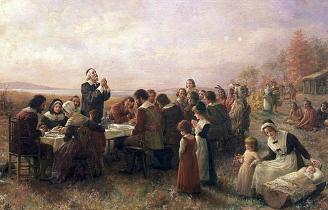Here’s why we shouldn’t celebrate Thanksgiving
After years of being constantly annoyed and often angry about the historical denial built into Thanksgiving Day, I published an essay in November 2005 suggesting we replace the feasting with fasting and create a National Day of Atonement to acknowledge the genocide of indigenous people that is central to the creation of the United States.
I expected criticism from right-wing and centrist people, given their common commitment to this country’s distorted self-image that supports the triumphalist/supremacist notions about the United States so common in conventional politics, and I got plenty of such critique. But I was surprised by the resistance from liberals, including a considerable number of my friends.
The most common argument went something like this: OK, it’s true that the Thanksgiving Day mythology is rooted in a fraudulent story — about the European invaders coming in peace to the “New World,” eager to cooperate with indigenous people — which conveniently ignores the reality of European barbarism in the conquest of the continent. But we can reject the culture’s self-congratulatory attempts to rewrite history, I have been told, and come together on Thanksgiving to celebrate the love and connections among family and friends.
The argument that we can ignore the collective cultural definition of Thanksgiving and create our own meaning in private has always struck me as odd. This commitment to Thanksgiving puts these left/radical critics in the position of internalizing one of the central messages promoted by the ideologues of capitalism — that individual behavior in private is more important than collective action in public. The claim that through private action we can create our own reality is one of the key tenets of a predatory corporate capitalism that naturalizes unjust hierarchy, a part of the overall project of discouraging political struggle and encouraging us to retreat into a private realm where life is defined by consumption.
So this November, rather than mount another attack on the national mythology around Thanksgiving — a mythology that amounts to a kind of holocaust denial, and which has been critiqued for many years by many people — I want to explore why so many who understand and accept this critique still celebrate Thanksgiving, and why rejecting such celebrations sparks such controversy.



